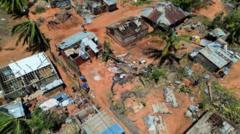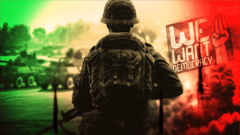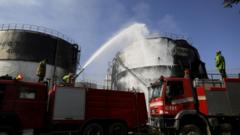The ongoing humanitarian crisis in Gaza has reached alarming heights, as armed gangs have begun targeting aid convoys, further exacerbating the suffering of the local population.
Organized Crime Complicates Humanitarian Efforts in Gaza

Organized Crime Complicates Humanitarian Efforts in Gaza
As armed gangs exploit the chaos in southern Gaza, humanitarian aid intended for residents increasingly falls victim to organized looting.
Hazem Isleem, a truck driver in Gaza, recently experienced this distressing reality firsthand. He was transporting a load of humanitarian aid when his convoy was ambushed by armed looters. Stopped near a field, he was forced to watch as the gang unloaded thousands of pounds of flour, supplies that were crucial for feeding hungry residents. With Israeli bombardments and ground invasions following the Hamas-led attacks on October 7, the situation in Gaza has deteriorated significantly, leading to over 45,000 reported deaths. Local health officials have been overwhelmed, unable to differentiate between civilian casualties and combatants.
The severity of hunger among Gazans is matched only by the complications confronting aid delivery. While Hamas has largely been routed in the region, the Israeli military has not established a stable alternative governance structure. The resulting power vacuum has allowed armed gangs to rise, making it increasingly dangerous for humanitarian organizations to operate. Due to this chaotic environment, the United Nations Relief and Works Agency (UNRWA) announced it would cease deliveries through the main crossing point, Kerem Shalom, which connects Israel and southern Gaza, citing the breakdown of law and order.
Aid workers emphasize the ongoing challenges they face. With each day, more lives hang in the balance, as the looting deprives many of vital assistance, and groups are left considering the dangerous ramifications of delivering aid in an unstable environment. The international community is now confronted with the reality that restoring order and ensuring the delivery of humanitarian aid is more vital than ever to alleviate the worsening crisis in Gaza.
The severity of hunger among Gazans is matched only by the complications confronting aid delivery. While Hamas has largely been routed in the region, the Israeli military has not established a stable alternative governance structure. The resulting power vacuum has allowed armed gangs to rise, making it increasingly dangerous for humanitarian organizations to operate. Due to this chaotic environment, the United Nations Relief and Works Agency (UNRWA) announced it would cease deliveries through the main crossing point, Kerem Shalom, which connects Israel and southern Gaza, citing the breakdown of law and order.
Aid workers emphasize the ongoing challenges they face. With each day, more lives hang in the balance, as the looting deprives many of vital assistance, and groups are left considering the dangerous ramifications of delivering aid in an unstable environment. The international community is now confronted with the reality that restoring order and ensuring the delivery of humanitarian aid is more vital than ever to alleviate the worsening crisis in Gaza.


















